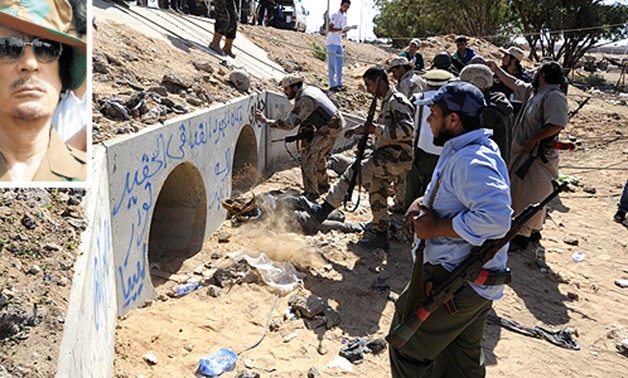
Libyan National Transitional Council (NTC) fighters after pulling ousted leader Muammar Gaddafi from a culvert and killing him in the coastal city of Sirte on October 20, 2011- AFP
CAIRO – 9 January 2018: Libya's national army commander Khalifa Haftar condemned the brutal murder of former President Muammar Gaddafi in February, 2011. "When I arrived in Tripoli one week after the eruption of the Libyan uprising, Gaddafi called me and I told him to hand over the power to the people, but he did not listen to my advice," he said.
The Libyan national army commander expressed his reservations over the U.N plan proposed by Ghassan Salama, Special Envoy to Libya. Haftar stressed that the Skhirat Agreement "must be amended."
In an interview with the weekly Jeune Afrique magazine, Haftar asserted that Algeria could be a "neutral mediator" between Libyan factions, adding, "Unity of Libyans is as important to Algerians as their divisions are harmful to us."
"Ghassan's plan may take one or two years to be implemented. Drafting Libya's constitution would take not less than three years, but first the parliamentary and presidential elections should take place mid-2018," Haftar said during the interview on Tuesday with the African magazine which is published in French and translated by many Arab news websites.
Haftar stressed that the Libyan National army controls over 90 percent of the Libyan territory with a military capacity of 75,000 soldiers who are capable of controlling the Libyan southern border with Egypt and Tunisia.
He added, "The Libyan election should offer a political solution and stop the bloodshed of Libyans," and stressed that the elections must be held before forming the new constitution. "Elections must take place as soon as possible," Haftar said.
Haftar added that following the political course is better than following other courses, but "when the electoral process does not stop the bloodshed, the National Army will intervene via sleeper cells located in 10 percent of the Libyan territory where the army does not have entire control."
In regards to news about intention of Saif al-Islam Gaddafi, the son of the former Libyan president, to run for the upcoming presidential elections, Haftar said, "Saif al-Islam lacks political experience; we are chasing a losing wager if we bet on him."
In December, Libyan tribal chief and spokesperson of the Gaddafi family, Basem al-Hashimi al-Soul, revealed to Egypt Today that Saif al-Islam Gaddafi intends to run for the upcoming presidential elections, due in 2018.
Haftar claimed that Saif al-Islam does not enjoy the sufficient popularity to guarantee him an effective role in the next stage of Libya's future.
"On many occasions, I tried to push Libyan Prime Minister Fayez al-Sarraj to take decisive actions, but he did not," Haftar stated.
On December 17, Haftar announced the end of the Skhirat Agreement, describing it as "a bad sign for stability and consensus," according to political observers and experts who spoke with Egypt Today.
Haftar said that he does not recognize any decisions issued by the political bodies linked to it, in reference to the Government of National Accord (GNA).
When 22 Libyan parliamentarians signed the Skhirat Agreement in December 2015 in Morocco, they sought to end the civil war in Libya, which erupted in 2014. The Skhirat Agreement was put into practice on April 6, 2016.
The GNA, led by Fayez al-Sarraj, was the first concrete outcome from the Skhirat Agreement. The first meeting of the cabinet of the GNA took place on January 2, 2016 in Tunis.


Comments
Leave a Comment